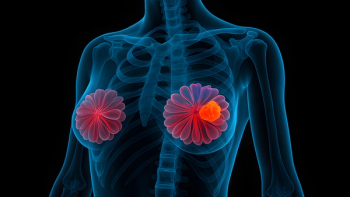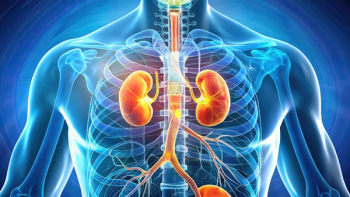
Results from the first part of a Phase I/II trial (NCT06569823) showed that Z-1018 generated immune responses comparable to Shingrix, with a 100% antibody response rate and nearly 90% CD4⁺ T-cell response in patients with shingles.

FDA approves COVID-19 vaccines from Moderna, Pfizer-BioNTech, and Novavax targeting the LP.8.1 sublineage of SARS-CoV-2, with eligibility limited to adults aged 65 years and older and those with underlying medical conditions that place them with a high risk for severe disease.

Evrysdi Helps Presymptomatic Infants with Spinal Muscular Atrophy Sit, Stand, and Walk in Phase II Trial

Results from the first part of a Phase I/II trial (NCT06569823) showed that Z-1018 generated immune responses comparable to Shingrix, with a 100% antibody response rate and nearly 90% CD4⁺ T-cell response in patients with shingles.

The Phase II EvolvE trial (NCT05774184) confirmed barzolvolimab’s mechanism of action but showed no measurable improvement in dysphagia symptoms or esophageal inflammation in patients with eosinophilic esophagitis.

Results from the Phase II OptiTROP-Lung01 trial (NCT05351788) showed that Sichuan Kelun-Biotech’s sac-TMT combined with tagitanlimab demonstrated promising anti-tumor activity and manageable safety as a first-line treatment for advanced or metastatic non-small cell lung cancer.

The trial’s first patient has been treated to assess the BREATHE Airway Scaffold, which was developed to enhance breathing and daily functioning in patients with severe emphysema.

Results from the Phase II COLLECTiVE202 trial (NCT05370885) demonstrated a statistically significant difference between VE202 and placebo in producing endoscopic or clinical responses in patients with mild-to-moderate ulcerative colitis.

Results from a Phase II trial (NCT06640972) showed that patients treated with RDX-002 experienced significant reductions in postprandial triglycerides, less weight regain after GLP-1 therapy, and improvements in key cardiometabolic markers.

The global Phase III EMPEROR trial (NCT06872125) will evaluate the safety and efficacy of zorevunersen, a novel antisense oligonucleotide designed to reduce seizures and improve cognitive and behavioral outcomes in children with Dravet syndrome.

Results from the Phase III EPCORE FL-1 trial (NCT05409066) showed that patients treated with Epkinly (epcoritamab) in combination with Rituxan (rituximab) and Revlimid (lenalidomide) for relapsed or refractory follicular lymphoma demonstrated significant improvements in overall response rate and progression-free survival.

Results from the Phase III ATTAIN-1 trial (NCT05869903) showed that the highest dose of orforglipron achieved an average weight reduction of 12.4% in patients with obesity or overweight.

The biotech company extends its Phase I trial (NCT06252220) of DA-1726 to eight weeks following encouraging early efficacy, safety, and weight loss data in patients with obesity.

Company opts not to advance VX-993 into pivotal development after Phase II data show no statistically significant benefit over placebo in post-bunionectomy surgical pain relief.

The FDA’s green light for a Phase II trial (JSKN003-202) of JSKN003 accelerates efforts to address platinum-resistant ovarian and related gynecologic cancers.

Results from the long-term extension of the Phase III TRAILBLAZER-ALZ 2 trial (NCT04437511) showed sustained benefits with early Kisunla treatment, including reduced risk of disease progression and high rates of amyloid clearance in early Alzheimer disease.

Results from the Phase III Clarity AD open-label extension trial (NCT03887455) suggest weekly subcutaneous maintenance dosing with Leqembi may offer a more convenient and well-tolerated alternative for patients continuing long-term treatment.

Results from the Phase III BRUIN CLL-314 trial (NCT05254743) showed that Jaypirca (pirtobrutinib) achieved superiority in overall response rates compared to Imbruvica (ibrutinib) in patients with chronic lymphocytic leukemia or small lymphocytic lymphoma.

Results from the Phase III VIKTORIA-1 trial (NCT05501886) demonstrated that gedatolisib administered with fulvestrant, with or without Ibrance (palbociclib), showed statistically significant and clinically meaningful improvements in progression-free survival in patients with HR-positive, HER2-negative, PIK3CA wild-type advanced breast cancer.

Results from the Phase III PREVAIL trial (NCT05556096) of gefurulimab demonstrated a statistically significant and clinically meaningful improvement in Myasthenia Gravis Activities of Daily Living at 26 weeks compared to placebo.

Results from the Phase III ABTECT-1 (NCT05507203) and ABTECT-2 (NCT05507216) trials showed that Abivax’s obefazimod demonstrated significant clinical remission in patients with ulcerative colitis.

The Phase III INDEPENDENCE trial (NCT04717414) failed to meet its primary endpoint of achieving transfusion independence in patients with myelofibrosis-associated anemia treated with Reblozyl (luspatercept-aamt).

Results from the Phase III PURPOSE 1 (NCT04994509) and PURPOSE 2 (NCT04925752) trials highlight Yeztugo’s (lenacapavir) safety and efficacy in pregnant women, young adults, and others historically excluded from HIV prevention studies.

Results from a Phase Ib trial (NCT03666000) show that azer-cel demonstrated a 75% overall response rate and a 55% complete response in patients with relapsed/refractory diffuse large b-cell lymphoma.

Results from a retrospective study found that Amtagvi (lifileucel) achieved a 48.8% objective response rate in patients with advanced melanoma who had previously received immune checkpoint inhibitors.

Results from the Phase III CAHtalyst show that patients treated with Crenessity for classic congenital adrenal hyperplasia achieved and maintained lower, more physiologic glucocorticoid doses while keeping key adrenal biomarkers at or below baseline levels.

Results from the Phase III EMBARK trial show that in combination with leuprolide, Xtandi (enzalutamide) demonstrated a statistically significant and clinically meaningful overall survival benefit in men with non-metastatic hormone-sensitive prostate cancer and high-risk biochemical recurrence.

Results from the Phase III KEYNOTE-689 trial show that adding perioperative Keytruda (pembrolizumab) to standard-of-care radiotherapy improves event-free survival in patients with resectable, locally advanced head and neck squamous cell carcinoma, potentially setting a new benchmark for treatment in this setting.